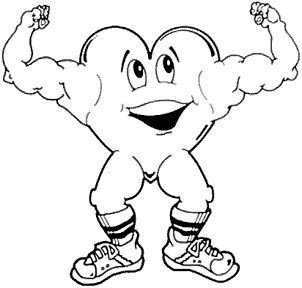|
 
In this page you can...
 Build up a good
health with giving 15 minutes attention in your day life for something you left unnoticed... HOW? Build up a good
health with giving 15 minutes attention in your day life for something you left unnoticed... HOW?
 Possess a good
heart. Know your heart and know the simple methods to avoid all heart diseases... HOW? Possess a good
heart. Know your heart and know the simple methods to avoid all heart diseases... HOW?
 Avoid heart
attack by drinking hot water, really??... HOW? Avoid heart
attack by drinking hot water, really??... HOW?
 Calculate your BMI
(Body Mass Index). People talk about (BMI). You know... HOW? Calculate your BMI
(Body Mass Index). People talk about (BMI). You know... HOW?
 Reduce 20 pounds
from your weight! There are 20 more reasons... HOW and WHY? Reduce 20 pounds
from your weight! There are 20 more reasons... HOW and WHY?
 Simply quit
smoking! I know smoking is dangerous than we think. Read how simply some
people quit smoking... HOW? Simply quit
smoking! I know smoking is dangerous than we think. Read how simply some
people quit smoking... HOW?


Body is yours, Keep it
healthy!
Experts offer tips on keeping that get-fit resolution. Experts at the International Council on Active Aging
(ICAA) offer advice to help older Americans stay with the program in 2007.
To begin, schedule 15 minutes a day for
the next four days to plan how you're going to get started. You can boost your motivation by getting a friend involved or
by starting a club at your community center or place of worship.
Here are 10 tips for active, healthy aging:
Buy a good pair of shoes. Comfortable,
well-fitting shoes are essential. Foot pain is not a normal part of aging, says the American Podiatric Medical Association.
Play games to keep your brain sharp. There
are many different kinds of games -- such as trivia, memory and math -- and skill levels to suit all kinds of people. Games
can also be a fun way to spend time with others.
Go for walks, which will help improve lower
body strength, maintain mobility and help prevent cognitive decline. Start easy and gradually increase your speed and distance.
If you rely on a cane, walker or wheelchair, you can ask a friend to join you for outings.
Do balance exercises to help you with everyday
activities, such as reaching into cupboards. Good balance also helps prevent falls. Many exercise classes for older adults
include balance training.
Get your eyes checked. A study published
this year in the Journal of the American Medical Association found that nearly all vision impairment in a large group
of people older than 60 years could be improved with corrective lenses.

Increase your physical activity. This can
include yard and house work, walking to the store, or playing ball with the neighbor children. Make a weekly walking date
with a friend, join a wellness center, community center, or a health club with programs geared to your interests and needs.
Nurture relationships with family, friends
and neighbors. These kinds of social connections are good for your emotional well-being.
Eat plenty of fruits and vegetables.
Laugh a lot. Laughing increases circulation,
immune system defenses and mental function.
Get seven to eight hours of sleep per night.
If you have trouble falling or staying asleep, make a few changes such as: skipping daytime naps; adopting a nighttime routine;
starting a regular exercise program. Changing habits does more to improve sleep than taking medications.
You don't have to do all these things at
once, the ICAA said. Start trying them over the next few months.

Go to Top

Here is a chat, arranged by WIPRO for
its employees, with Dr.Devi Shetty, Narayana Hrudayalaya (Heart Specialist) Bangalore. The transcript of the chat is given
below with a hop that it will be useful for everyone.
Take a look, when time permits!
****************************
Qn: What are the five thumb rules
for a layman to take care of his heart?
Ans: 1.
Diet - Less of carbohydrate, more of protein, less oil.
2. Exercise - Half an hour's walk, at
least five days a week; avoid lifts and avoid sitting for a longtime.
3. Quit smoking
4. Control weight
5. Control blood pressure and sugar
Qn: Is eating non-veg food (fish) good
for the heart?
Ans: No.
Qn: It's still a grave shock to hear
that some apparently healthy person gets a cardiac arrest. How do we understand it in perspective?
Ans: This is called silent attack; that is why we recommend
everyone past the age of 30 to undergo routine health checkups.
Qn: Are heart diseases hereditary?
Ans: Yes.
Qn: What are the ways in which the
heart is stressed? What practices do you suggest to de-stress?
Ans: Change your attitude towards life. Do not look
for perfection in everything in life.
Qn: Is walking better than jogging
or is more intensive exercise required to keep a healthy heart?
Ans: Walking is better than jogging since jogging leads
to early fatigue and injury to joints.
Qn: You have done so much for the
poor and needy. What has inspired you to do so?
Ans: Mother Theresa, who was my patient.
Qn: Can people with low blood pressure
suffer heart diseases?
Ans: Extremely rare.
Qn: Does cholestrol accumulate right
from an early age (20's) or do you have to worry about it only after you are above 30 years of age?
Ans: Cholesterol accumulates from childhood.
Qn: How do irregular eating habits affect
the heart? Ans: You tend to eat junk food when the habits are irregular and your body's enzyme release for digestion gets confused.
 
Qn: How can I control cholesterol
content without using medicines?
Ans: Control diet, walk and eat
walnut.
Qn: Can yoga prevent heart ailments?
Ans: Yoga helps.
Qn: Which is the best and worst
food for the heart?
Ans: Best food is fruits worst are
oil.
Qn: Which oil is better - gingili,
groundnut, sunflower, saffola, olive?
Ans: All oils are bad; the so-called
best oil company has the largest marketing budget.
Qn: What is the routine checkup
should go through? Is there specific test?
Ans: Routine blood test to ensure
sugar, cholesterol is ok. Check BP, Treadmill test after an echo.
Qn: What are the first aid steps
to be taken on a heart attack?
Ans: Help the person into a sleeping
position, put an aspirin tablet under the tongue with a sorbitrate tablet if available, and rush
him to a coronary care unit since the maximum casualty takes place within the first hour.
Qn: How do you differentiate between
pain caused by a heart attack and that caused due to gastric trouble?
Ans: Extremely difficult without
ECG.
Qn: What is the main cause of a
steep increase in heart problems amongst youngsters? I see people of about 30-40 yrs of age having heart attacks and serious
heart problems?
Ans: Increased awareness has increased
incidents. Also, sedentary lifestyles, smoking, junk food, lack of exercise in a country where people are genetically three
times more vulnerable for heart attacks than Europeans and Americans.
Qn: Is it possible for a person
to have BP outside the normal range of 120/80 and yet be perfectly healthy?
Ans: Yes.
Qn: Marriages within close relatives
can lead to heart problems for the child. Is it true?
Ans: Yes, co-sanguinity leads to
congenital abnormalities and you may not have a software engineer as a child.

Q n: Many of us have an irregular
daily routine and many a times we have to stay late nights in office. Does this affect our heart? What precautions would you
recommend?
Ans: When you are young, nature
protects you against all these irregularities. However, as you grow older, respect the biological clock.
Qn: Will taking anti-hypertensive
drugs cause some other complications (short / long term)?
Ans: Yes, most drugs have some side
effects. However, modern anti-hypertensive drugs are extremely safe.
Qn: Will consuming more coffee/tea
lead to heart attacks?
Ans: No.
Qn: Are asthma patients more prone
to heart disease?
Ans: No.
Qn: How would you define junk food?
Ans: Fried food like Kentucky, McDonalds, Samosas, and even Masala Dosas.
Qn: You mentioned that Indians are
three times more vulnerable. What is the reason for this, as Europeans and Americans also eat a lot of junk food?
Ans: Every race is vulnerable to
some disease and unfortunately, Indians are vulnerable for the most expensive disease.
Qn: Does consuming bananas help
reduce hypertension?
Ans: No.
Qn: Can a person help himself
during a heart attack (Because we see a lot of forwarded emails on this)?
Ans: Yes. Lie down comfortably and
put an aspirin tablet of any description under the tongue and ask someone to take you to the nearest coronary care unit without
any delay and do not wait for the ambulance since most of the time, the ambulance does not turn up.

Qn: Do, in any way, low white blood cells
and low hemoglobin count lead to heart problems?
Ans: No. But it is ideal to have normal hemoglobin
level to increase your exercise capacity.
Qn: Sometimes, due to the hectic schedule we are not
able to exercise. So, does walking while doing daily chores at home or climbing the stairs in the house, work as a substitute
for exercise?
Ans: Certainly. Avoid sitting continuously for more
than half an hour and even the act of getting out of the chair and going to another chair and sitting helps a lot.
Qn: Is there a relation between heart
problems and blood sugar?
Ans: Yes. A strong relationship since diabetics are
more vulnerable to heart attacks than non-diabetics.
Qn: What are the things one needs
to take care of after a heart operation?
Ans: Diet, exercise, drugs on time. Control cholesterol,
BP, weight.
Qn: Are people working on night shifts
more vulnerable to heart disease when compared to day shift workers?
Ans: No.
Qn: What are the modern anti-hypertensive
drugs?
Ans: There are hundreds of drugs and your doctor will
chose the right combination for your problem, but my suggestion is to avoid the drugs and go for natural ways of controlling
blood pressure by walk, diet to reduce weight and changing attitudes towards lifestyles.
Qn: Does dispirin or similar headache
pills increase the risk of heart attacks?
Ans: No.
Qn: Why is the rate of heart attacks more
in men than in women?
Ans: Nature protects women till the age of 45.
Qn: How can one keep the heart in a good
condition?
Ans: Eat a healthy diet, avoid junk food, exercise
everyday, do not smoke, and go for a health checkup if you are past the age of 30 for at least once in two years.
Go to Top

WARNING:
GLOBAL WARMING 

HEART ATTACKS AND DRINKING WARM
WATER
(Read this...It
could save your life!)
This is a very good
article. Not only about the warm water after your meal, but about heart attacks. This makes sense.. the Chinese and Japanese
drink hot tea with their meals...not cold water...maybe it is time we adopt their drinking habit while eating!
Nothing to lose, everything to gain...
For those who like
to drink cold water, this article is applicable to you. It is nice to have a cup of cold drink after a meal. However, the
cold water will solidify the oily stuff that you have just consumed. It will slow down the digestion. Once this "sludge" reacts
with the acid, it will break down and be absorbed by the intestine faster than the solid food. It will line the intestine.
Very soon, this will turn into fats and lead to cancer. It is best to drink hot soup or warm water after a meal.
A serious note about heart attacks: You should know that not every heart attack symptom
is going to be the left arm hurting. Be aware of intense pain in the jaw line. You may never have the first chest pain during
the course of a heart attack. Nausea and intense sweating are also common symptoms. 60% of people who have a heart attack
while they are asleep do not wake up. Pain in the jaw can wake you from a sound sleep. Let's be careful and be aware. The
more we know the better chance we could survive...
A cardiologist says if everyone who gets this information passes to 10 people, you can
be sure that we'll save at least one life!
And from now; I, M. Sadique
request you to take care of your health, Work Joyfully and enjoy your Life.... Make your life Beeaautiful!!


|

